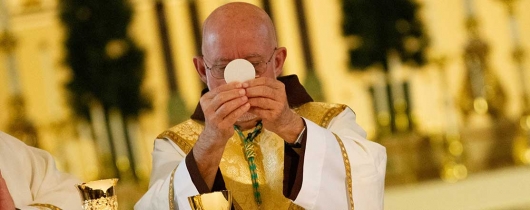Real Presence

Memorial of St. Scholastica, Virgin and Founder
1 Kings 8:1-7, 9-13; Mark 6:53-56
Last August, a Pew Center poll was released that caused shock, dismay and confusion among many in the Church. The poll found that only about one-third of the Catholics surveyed believed in the real presence of Jesus in the Eucharist. It was noted that part of the problem may have been in how the question was worded: it asked respondents if they believed in the “actual” presence of Jesus, which many could have easily understood as the literal presence of the Lord’s Body and Blood.
Of course, in its teaching on the real presence, the Church does not teach that Jesus is literally (i.e. physically) present in the Eucharist. But he is really and truly present in ways that transcend what our senses—especially sight, touch and taste—tell us. This shouldn’t be too hard to understand. We can, for example, sense the presence of a loved one, even one who has died, even though they are not physically with us.
Today’s scripture readings and memorial remind us of the many ways in which God—Father, Son and Holy Spirit—are present. In our first reading, which recounts the dedication of the Temple that King Solomon built in Jerusalem, God is present in ritual and the Ark of the Covenant. In our gospel reading, God is present in Jesus and his many acts of healing and compassion for those who are suffering.
The Church teaches us that the real presence of Jesus in the Mass goes beyond the “Eucharistic species” or the bread and wine transubstantiated into the Body and Blood of Christ. Jesus is also really and truly present in the word of God proclaimed from the Scriptures in the Lectionary. He is similarly present in the people of God, the Body of Christ assembled for the Mass. Finally, he is present (however imperfectly) in the priest who presides over the celebration.
Just as Jesus is truly present in the Eucharist that we share at Mass, and just as we receive the graces of that sacrament, we are called to make him truly present in the Church and in the world. St. Scholastica and her twin brother St. Benedict understood this and exemplified in their lives. They died in the 6th century but the religious communities they founded are still around today. Through their intercession, we pray for the grace and the integrity to share the real presence of Jesus not only within the places where we worship but everywhere we go. –jc




